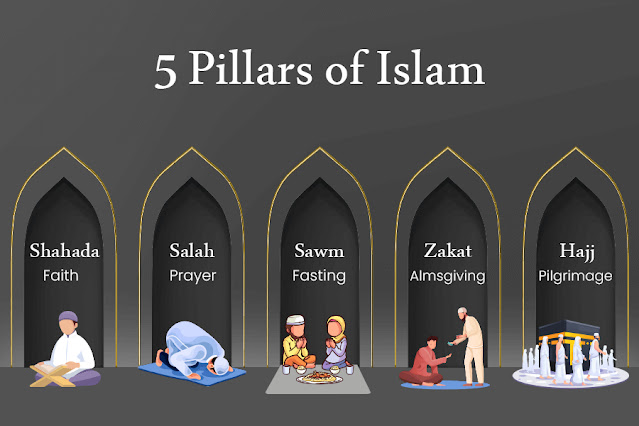The Five Pillars of Islam: A Comprehensive Guide
The Shahada serves as a constant reminder of the unity and singularity of Allah, reinforcing the core belief that there is no deity worthy of worship except Him. It also signifies the acceptance of Prophet Muhammad as the final messenger, tasked with delivering Allah's guidance to humanity. The Shahada is recited in various occasions, including the conversion to Islam, daily prayers, and important life events.
Salah: The Ritual Prayer
Salah, or the ritual prayer, is the second pillar of Islam and holds immense significance in the daily lives of Muslims. It is a means of establishing a direct connection with Allah through physical and spiritual devotion. Muslims are obligated to perform five daily prayers, known as Fajr, Dhuhr, Asr, Maghrib, and Isha. Each prayer consists of specific movements, recitations, and supplications, providing an opportunity for spiritual reflection and seeking divine guidance.
The act of Salah involves physical cleansing, facing the Kaaba in Mecca, and reciting verses from the Quran in Arabic. It is a ritual of submission and humility before Allah, with the aim of purifying the heart and seeking closeness to the Divine. Through regular prayer, Muslims establish a consistent connection with Allah, seeking His guidance, expressing gratitude, and seeking forgiveness for any transgressions. Salah serves as a constant reminder of the presence of Allah in every aspect of life and reinforces the importance of spiritual discipline.
Zakat: The Act of Giving
Zakat is not only a financial obligation but also a spiritual duty. By giving to those in need, Muslims acknowledge that all wealth and possessions ultimately belong to Allah. It serves as a means of purifying one's wealth from greed and selfishness, reminding individuals of the temporary nature of material possessions. Zakat promotes social justice and solidarity by redistributing wealth and providing support to those facing financial hardships. It is typically distributed to categories such as the poor, the needy, those in debt, travelers, and the welfare of the community as a whole.
Sawm: Fasting during Ramadan
Sawm, or fasting, is observed during the holy month of Ramadan. It is the fourth pillar of Islam and involves abstaining from food, drink, and other physical needs from dawn until sunset. Fasting serves as an act of self-discipline, spiritual purification, and empathy towards those less fortunate. Muslims engage in increased acts of worship, self-reflection, and charitable deeds during this sacred period. The fast is broken each evening with the communal meal known as Iftar.
Fasting during Ramadan is a profound spiritual experience for Muslims. It teaches self-control, patience, and gratitude while heightening one's awareness of the blessings and privileges in life. By abstaining from worldly desires and focusing on spiritual pursuits, Muslims seek to attain closeness to Allah and attain a higher level of consciousness. Fasting also serves as a means of developing empathy and compassion for those who are hungry and deprived, deepening one's appreciation for the blessings of sustenance and nourishment.
Hajj: The Pilgrimage to Mecca
Hajj, the pilgrimage to Mecca, represents the fifth pillar of Islam and is obligatory for those physically and financially capable. It is a once-in-a-lifetime journey that symbolizes unity, equality, and submission to Allah. Each year, millions of Muslims from around the world gather in Mecca to perform a series of rituals, following in the footsteps of Prophet Muhammad. The Hajj experience fosters spiritual renewal, forgiveness, and a deep sense of connection with the global Muslim community.
The rituals of Hajj commemorate the life and trials of Prophet Ibrahim (Abraham) and his family. Pilgrims perform rituals such as circling the Kaaba, running between Safa and Marwa, and standing on the plains of Arafat. The Hajj journey brings together Muslims from diverse backgrounds, fostering a sense of unity, equality, and universal brotherhood. It serves as a reminder of the transient nature of life and the ultimate purpose of submission to Allah.
Conclusion:
The Five Pillars of Islam, comprising Shahada, Salah, Zakat, Sawm, and Hajj, form the cornerstone of Islamic belief and practice. Through these pillars, Muslims strive to strengthen their faith, cultivate moral values, and establish a harmonious relationship with Allah. Each pillar carries profound significance and serves as a means of spiritual growth, self-discipline, and connection with the global Muslim community.Embarking on a journey of understanding the Five Pillars of Islam and engaging in Islamic studies is an enriching experience that deepens one's knowledge and appreciation of the Islamic faith.
To further enhance your understanding, consider enrolling in an online Quran Academy. These academies offer comprehensive courses, qualified instructors, and interactive learning platforms that cater to individuals of all ages and backgrounds. By joining an online Quran Academy, you can explore the core principles of Islamic studies, gain valuable insights, and foster a deeper connection with the teachings of Islam.Embark on your Islamic studies journey today by joining an online Quran Academy and unlock a wealth of knowledge and spiritual growth.



.jpg)
Comments
Post a Comment